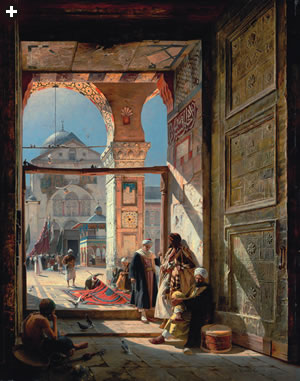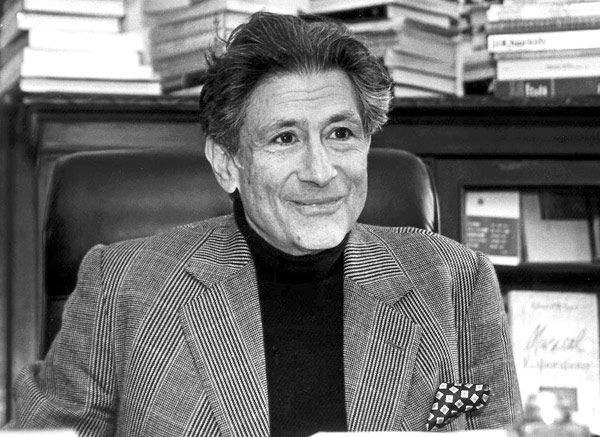Orientalism was and always one of my favourite subjects. It helps my understanding and challenges my ability to analyse current events such as the Zionist crime in Palestine, under the shade of role played by the ‘experts’ behind the scene. Our main figures among the Orientalists whom we analyse their works and impact to the global political situation are Bernard Lewis and his main opponent, the late Edward Said. During my study in IIUM, I received this question for an open book exam from Prof Abdullah al-Ahsan:
“Orientalist scholars have tended to use their standing as experts to deny – and sometimes even to cover – their deep-seated feeling about Islam with a language of authority whose purpose is to certify their “objectivity” and “scientific impartiality”. Analyze this statement.
This was my response to the above question:
ORIENTALISM
Orientalism is a term, generally refers to the study of the Eastern Civilisations. But when we want to discuss about the relationship between Orientalism and Islam, as part of what to be considered as the East, we need to carefully study the historical background of the Orientalism.
The term ‘Orientalism’ is similar to ‘Oriental’, as both of them came from the Latin word ‘Orien’ which means ‘rising of the sun’, to give the meaning ‘the East’ in a relative sense. When the East was identified as the ‘Orient’, the opposite term referring to the West is the ‘Occident’ which can be seen largely dropped from common usage to refer to the ‘West’.
Over the history, ‘the Orient’ and its understanding have continuously shifted as the European explored Asia deeper and deeper. All these developments can cause confusion in term of the historical and geographical scope of the Oriental studies.
Even though the Orientalism might largely include the entire Eastern Civilizations, as far as the Pacific Ocean, the association of Orientalism with Islam has a long history which could enlighten the question given by the examiner.
“Orientalist scholars have tended to use their standing as experts to deny – and sometimes even to cover – their deep-seated feeling about Islam with a language of authority whose purpose is to certify their “objectivity” and “scientific impartiality”.
The statement above gives a negative connotation about Orientalism as a whole, if the issue is not placed in a proper context. To generalize the idea that Orientalism is a negative subject against the interest of Islam, might not do justice to a significant number of those Orientalists who studied Islam simply because of their admiration towards Islam and its civilization. Those like Nicholson and Arberry were far away from the negative motivation of colonial interests or Christian sentiments against Islam in their works.
Edward Said
In order to distinguish between the multi attitude of the Orientalists towards Islam and the East, Edward Said gave several definitions of the term Orientalism in the introduction of his book, Orientalism (ISBN 0-394-74067-X):
- “a way of coming to terms with the Orient that is based on the Orient’s special place in European Western experienc” [page 1]
- “a distribution of geopolitical awareness into aesthetic, scholarly, economic, sociological, historical, and philological text” [page 12]
- “a Western style for dominating, restructuring, and having authority over the Orient” [page 3]
These are some of Edward Said’s descriptions regarding the term Orientalism. The first two definitions were more or less neutral. The ‘objective’ study of the Orientalists might be categorized under these two descriptions. But the third definition is more explicit in identifying the negative attitude which the other group of Orientalists might have against Islam.
Edward Said himself, in the Preface to the 2003 edition of his book, Orientalism, warned against the ‘falsely unifying rubrics that invent collective identities’, citing such terms as ‘America’, ‘The West’, and ‘Islam’ which were leading to what he felt was a manufactured of Bernard Lewis – Samuel Huntington’s ‘Clash of Civilizations’.
Zachary Lockman in his book, Contending Visions of the Middle East: The History and Politics of Orientalism [ISBN 0-521-62937-3] suggested that the history of the Orientalists negative attitude against Islam was deep-rooted as early as the Medieval Age of Europe when the sentiments of Crusades were dominating many parts of the Western Christendom. This might be identified as the 13th Century of Europe.
The failure of the last Crusades and the disappointment of the hopes placed in the Moghuls to destroy Islam helped some educated Christians in the West to realize that Islam was unlikely to be defeated by military force. They finally came to the conclusion, during the Church Council meeting held in Vienna in 1312, to endorse for the establishment of chairs in Arabic, Greek, Hebrew and Syrian at the universities of Paris, Oxford, Bologna, Avignon and Salamanca.
The Western scholars started to study the Eastern Civilizations, including the language and religion, with the motives of equipping their knowledge to tear down Islam.
But this kind of motivation in studying Islam and the East, faded away gradually when the Church lost their domination over the Western society which arrived at the stage of Renaissance, the rebirth of Western Civilization in the 15th Century, based on Rationality against the Biblical indoctrination.
The Western interest towards the East continued but with a different foundation. During the age of the Enlightenment, Voltaire promoted research into Zoroastrianism in the belief that it would support a rational Deism superior to Christianity. Other praised the relative religious tolerance of Islamic countries in contrast with the Christian West. The first serious European studies of Buddhism and Hinduism were undertaken by scholars such as The first serious European studies of Buddhism and Hinduism were undertaken by scholars such as Eugene Burnouf and Max Miller. During this period, the serious study of Islam also emerged. By the mid-19th century Oriental Studies was an established academic discipline.
Regarding the issue of the Orientalists’ objectivity, we can make a good comparison between some of those prominent Orientalists like Bernard Lewis versus Karen Armstrong, but within the limitation of our discussion, we would concentrate on analyzing the impact of Bernard Lewis who is considered as one of the highest authority among the ‘experts’ in Orientalism.
Edward Said’s work in Orientalism, was a phenomena. He popularized the subject and discovered the hidden side of the general understanding about Orientalism. In this book, Said picked Bernard Lewis as his main subject of critic.
Bernard Lewis criticized Edward Said’s work in Orientalism, claiming the Said’s account contains many factual and conceptual errors. He highlighted the positive contributions to the study of Eastern Cultures and Islam, done by the German scholars, who were in no way involved with the colonial mission. Edward Said, from Lewis point of view, failed to appreciate that.
Bernard Lewis also argued that Orientalism arose from the tradition of humanism. He emphasized that the humanist Orientalism was destined from Imperialist ideology and sometimes in opposition to it.
Lewis also continued his defense of Orientalism claiming that Orientalism is the study of Islam from the rejection of religious dogma and was an important spur to discovery of alternative cultures. Bernard Lewis’s critic was coloured as the ‘intellectual protectionism’.
But Lewis objectivity was in doubt once we compile all of his works in order to get a clearer picture of his mission. Many consider Lewis as an objective Orientalist because he praised Islam and its legacy in many of his works. But one should judge based on the finality of the bigger picture of certain issue, and not to be influenced by incomplete information, a remote of one from another.
For instance, we can examine Bernard Lewis’s article written in September 1990 under the title ‘The Roots of Muslim Rage’. He praised Islam saying that “Islam has brought comfort and peace of mind to countless millions of men and women”. Later on, he contradicted his earlier statement by emphasizing that, “in the classical Islamic view, to which many Muslims are beginning to return, the world and all mankind are divided into two: the House of Islam and the House of the Unbelief”
Lewis’s appreciation towards Islam was only meant to justify his ‘objectivity’ but the entire article targeted to present the inferior of Islam and Muslims in front of ‘us’, the Western society. Muslims envy the West simply because ‘we’ are richer and they are desperate to return to their ‘Old Glory’. In other word, Bernard Lewis was only trying to strengthen his idea of ‘Clash of Civilization’ that claimed Islam and Christianity could never co-exist.
Edward Said in his rebuttal to Bernard Lewis, he stated that Lewis’s negative rejoinder against him must be placed into its proper context. As we can see, one of Said’s principal arguments is that Orientalism was used as an instrument of empire, he argues that Lewis’ critique of his Orientalism could hardly be judged in the disinterested, scholarly light that Lewis would like to present himself, but must be understood in the proper knowledge of what Said claimed was Lewis’ own neo-imperialist proclivities. Therefore nothing Lewis said is genuine objective scholarship.
I would like to borrow Said’s commentary on the history of the Orientalism. He suggested that the whole Western European and American scholarship, literature and cultural representation creates prejudice against all of the non-Western cultures, putting them in the classification of ‘the Oriental’ or ‘the Others’.
In the current situation of the Arab World, Said’s theory is becoming more illuminating. It is obvious from the mainstream news media that Orientalism with that connotation is still very much alive.
Zachary Lockman added that during the First World War, many Orientalists had put their expertise at the service of the war effort. He gave some examples, such as British Orientalist D.G. Hogarth in Egypt. Bernard Lewis also began his career as an officer within British Intelligence Office.
The example of the Orientalists who utilise their position as ‘the experts’ to deny Islam are now explicitly demonstrated by the contemporary journalists in the American media such as CNN and Fox News. Edward Said analysed and criticized this trend in his important work Covering Islam: How the Media and the Experts Determine How We See the Rest of the World [ISBN: 0-679-75890-9]. The book was unique of its kind.
This might be the reason why Edward Said during his life was heavily criticised either by the Orientalists themselves or by the authority that hold the financial and political control. Said exposed the strategy of these experts who are unashamed to impose their superior attitude undermining their own people’s freedom of thinking and undermining Islam and Muslims whom they view as no worthy at all.
Using the ideas of Michael Foucault, Said emphasised the relationship between POWER and KNOWLEDGE in scholarly and popular thinking, particularly in regard the European views of the Islamic and Arab World. Said highlighted that Orient and the Occident worked as oppositional term, so that the ‘Orient’ was constructed as a negative inversion of Western culture. The status quo established through a massive effort done by those ‘experts’ to expand their knowledge and dominating others.
As a conclusion, the superior and authoritative attitude of the Orientalists had a long history, starting from the Church behaviour in the 13th Century and later continued by the colonial interests in the late 18th Century until today. Now, the neo-imperialist like Bernard Lewis continues the tradition.
Thus, it is a responsibility for Muslims to respond to this propaganda by developing their own Occidental approach based on our universal values which can be the foundation in searching of common ground for better dialogue of civilization. Only through the power of knowledge, both Orientalism and Occidentalism can be put in the appropriate context to develop a better world in the near future.
MATERIALS CONSULTED:
Edward Said, 1994, Orientalism, New York: A Vintage Books.
Edward Said, 1997, Covering Islam: How the Media and the Experts Determine How We See the Rest of the World, New York: A Vintage Books.
Zachary Lockman, 2005, Contending Visions of the Middle East: The History and Politics of Orientalism, Cambridge: Cambridge University Press.
Orientalism < http://en.wikipedia.org/wiki/Orientalism > last viewed on the July 30, 2013.
Hasrizal @ www.saifulislam
43000 BSP
 Saifulislam.Com Pendidikan Jalan Islah
Saifulislam.Com Pendidikan Jalan Islah







Menarik. Occidentalism dan Orientalism.
What will happen if both terms clashing to each other.
Occidentalist.. Who on earth can claim himself an occidentalist when it was’t given the room to expand. Any universities dare to cover this subject and we’ll see them to be expell. Reading only isn’t enough. Research without guidance isn’t enough too. The solution is dare to conquer the subject without fear. Who’s in?
thanks for the enlightment. i should read and study more after this…seems like a good topic to know